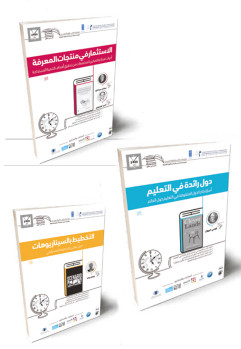Book in Minutes
Scenario Planning: A Field Guide to the Future
This book by Woody Wade provides an easy recipe for administrators whose tasks include strategic planning and causing practical change in their respective organizations.
The author gives 10 tips that enable the reader to learn the art and secret of being forward-looking when drawing the roadmap for the years ahead.
The book also includes many planning tools and business models that provide the reader with a rich reference to modern scientific methods for designing future scenarios before proceeding to prepare strategic plans.
Wade sees that the sooner you start early to form a clear future vision for your organization, the better; you manage to define and describe the expected changes. Then, he observes, you will succeed in building your organization in a successful manner, especially the way of dealing with the challenges and opportunities.
Knowledge Brokerage for Sustainable Development:
Innovative Tools for Increasing ResearchImpact and Evidence-Based Policymaking
In this book, the authors Michal Sedlacko and André Martinuzzi examine the eminent global challenges facing the knowledge brokerage industry.
The book offers an in-depth exploration of how knowledge brokerage has the potential to help manage the challenges of sustainable development, and presents a selection of innovative and practical tools to enhance the connectivity of research and policymaking on sustainable development issues. The book also reviews the keys to the success of the joint work between various institutions and marketing of knowledge products that contribute to shaping the future by enabling researchers to play a more effective role in the formulation of analytical studies and the progress of scientific evidence.
One of the most remarkable features of the book is that it gives an enjoyable reading experience that enables one to extract lessons learned through a set of interviews conducted by the authors with a group of international experts. The answers to the vital questions greatly help the reader in understanding the dimensions of the knowledge economy and how investment in scientific research has a noticeable role in changing the system of development and development policies.
The authors highlight successful European experiences in knowledge investment in the scientific research sector to take an influential role in the policies of sustainable development by focusing on knowledge production processes and tools that have contributed to the use of these knowledge products to improve policy-making outputs, through proving the real role of knowledge to find out practical solutions to the challenges that societies face.
The authors say: “The production of scientific knowledge and investment in scientific research has a lways been one o f the most important pillars by which countries’ progress is measured and used to chart the scale of their scientific progress. But the important question here is: are the products of knowledge used to serve societies and determine their destinies? Or remained on the shelves of research centers and across their electronic sources for academic researchers to rely on in their research and studies, without finding a way to be truly invested in policy-making and outlining future directions based on research conclusions to achieve sustainable development goals?”
Clever Lands:
The Secrets Behind the Success of the World’s Education Superpowers
In this book, Lucy Crehan takes us on a trip around the world to explore the secrets behind the success of top-performing education systems in the world. She writes about the ingredients of an efficient educational system, and how their distinguished experiences have had a tangible role in focusing on the quality of education. This involves preparing teachers and adopting school curricula on developing critical thinking skills and analysis, away from the usual teaching and indoctrination, to create a generation capable of creativity and innovation.
In detail, the author discusses the educational experiences of the Japanese, Finnish, Singaporean, Chinese, and Canadian schools. She focuses on the success story of the education in those countries, and suggests ways of building a strong educational system that contributes to achieving comprehensive human development.








